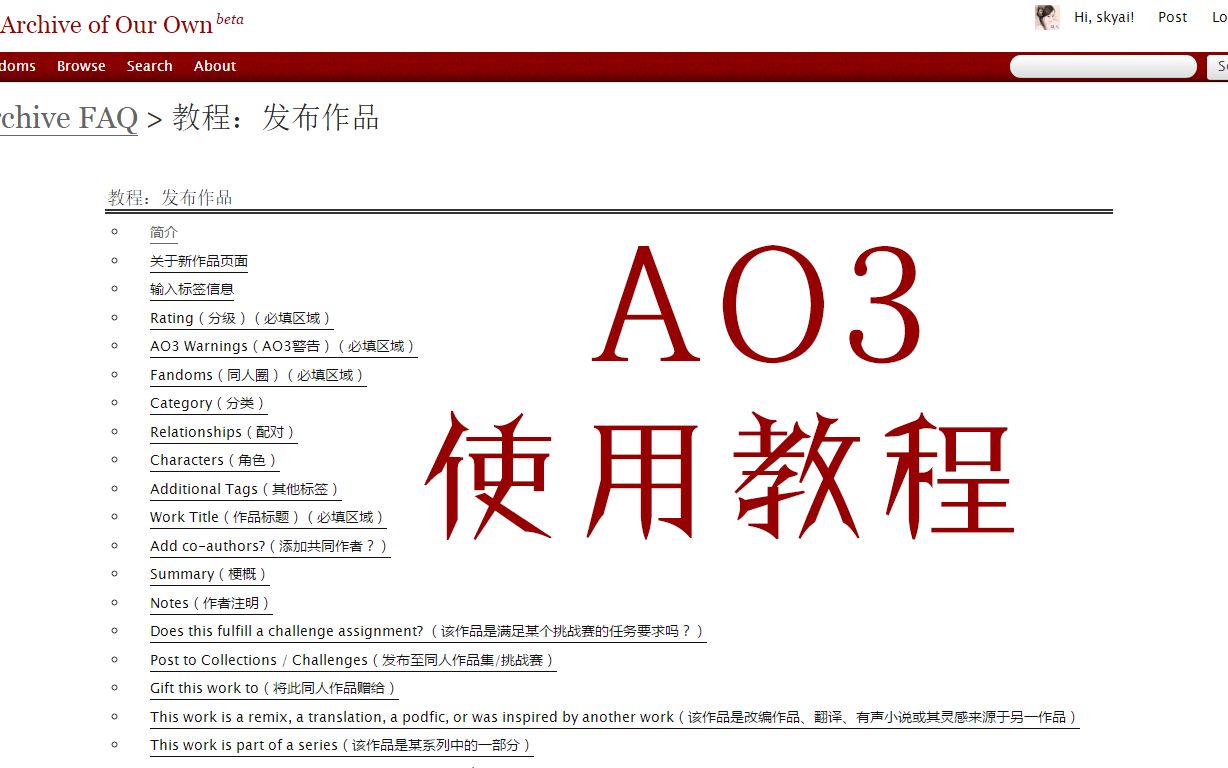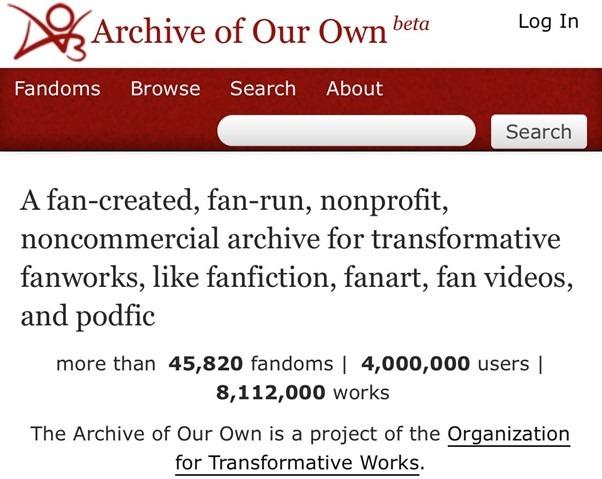AO3 Purity Test - Understanding Fanworks Archive
Table of Contents
- Introduction to AO3
- Taking Your First Steps - Is AO3 a Good Fit?
- Why AO3 Feels Different - The Fan-Made Difference
- What's the Deal with Tagging on AO3?
- What Does an AO3 Purity Test Really Mean?
- How Do Community Expectations Shape an AO3 Purity Test?
- Moving From FF.net to AO3 - What Changes?
- Growth and User Care - The AO3 Way
Stepping into a new online space, especially one like the Archive of Our Own, can feel like walking into a bustling library for the very first time. You might be wondering, you know, if it is a good spot to spend your time, or if it offers a safe place for your creative works and your reading habits. It’s a very common question, really, when you’ve only just heard about it and maybe used other platforms before. Many people come to it with a sense of curiosity, perhaps after hearing bits and pieces about it here and there, and they just want to get a clearer picture of what it's all about.
For those who have mostly used and put their writing on other sites, the idea of a new archive can bring up a lot of thoughts. You might be asking yourself if it truly measures up, or if it has the kind of atmosphere where you can feel at ease. It's a natural thing to consider, especially when you're thinking about putting your creative energy into a new spot. You want to feel like the place you choose respects your work and offers a secure environment for both writing and reading.
This particular space, the Archive of Our Own, has a rather distinct character, one that sets it apart from many other places on the internet. It’s something that people talk about a lot in fan circles, and there are even unofficial community spots dedicated to discussing it. So, you might find yourself seeing lots of mentions of AO3, and you might wonder what makes it special, or why so many people seem to have a strong preference for it.
Taking Your First Steps - Is AO3 a Good Fit?
When you're new to the Archive of Our Own, a common thought that pops up is whether it's a good or safe place to use. I mean, you've only recently come across it, and you're just looking to figure out if it's a spot you can trust. People often wonder if it's a welcoming place for new creations and for finding stories to enjoy. It's pretty understandable, considering you might have only ever used and put your own creative pieces on other platforms up until now. So, figuring out if this new place has a good vibe and keeps things secure is, you know, a pretty important first step for anyone.
- Can We Talk About The Economic State Of The World
- Avaleonx Onlyfans
- Jose Poyato Naked
- Alex Irle
- Derek Ponamsky
The core idea behind the Archive of Our Own is that it provides a central home for fanworks, and it does so without asking for money or trying to make a profit. This means it runs on some principles that are, in a way, helpful to keep in mind, especially if you're someone who values a space free from commercial pressures. It’s built by fans, for fans, and it runs on the dedication of volunteers, which is actually quite different from many other places you might find online. This structure shapes the whole experience, making it feel, in some respects, like a community project rather than a business.
For many, this non-commercial aspect is a big part of its appeal. You won't find advertisements cluttering up the pages, nor will you see your data being sold off to other companies. It’s a space that seems to prioritize the creative work itself and the people who make it, rather than trying to get something out of them. This kind of setup can make a new user feel, really, a lot more comfortable and secure about spending their time there, knowing that the focus is purely on the fan creations.
Why AO3 Feels Different - The Fan-Made Difference
One of the really striking things about AO3, something that sets it apart, is that it was made by fans and it continues to be run by fans who volunteer their time. This is, you know, a pretty big deal to keep in mind sometimes, especially since so many other places on the internet are run by really big media companies. Those other places can sometimes feel, in a way, a bit impersonal, or, you know, just kind of lacking in a certain warmth.
But with AO3, because it's built on volunteer effort and a love for fanworks, it carries a very different kind of energy. It's almost like a shared project, where everyone involved, from the people who keep the servers running to the folks who tag the stories, is doing it out of a genuine passion. This means the place has, in some respects, a kind of soul, a feeling of being cared for by the very people who use it. You can sense that care in the way the site is organized and in the way it operates.
This fan-centric approach also means that the platform tends to be very responsive to what its users want and need. Since the people running it are also users themselves, they understand the community's desires and struggles firsthand. It's not some distant corporation making decisions; it's a group of fellow fans trying to make the best possible home for creative expression. This makes the experience of using AO3 feel, to be honest, a lot more personal and connected.
What's the Deal with Tagging on AO3?
A lot of people who read on AO3 are quite familiar with how things work on FanFiction.net, and they often look for stories using similar ways of organizing things, especially with tags. But, you know, figuring out which pairings to tag and which ones not to tag can be a bit tricky, and it might even lead to some questions about an ao3 purity test, in a way. It’s not always straightforward, and there can be a lot of unwritten rules or community understandings about how to do it.
When you're new to writing on AO3, you might find yourself worrying about how to tag things. Because you're kind of new to the site, you might not know what some of the tags actually mean. And, honestly, the internet doesn't always have all the answers you need in one simple place. This can lead to a feeling of uncertainty, almost like there’s a secret code you need to crack to get your work seen or accepted by the community. It's a common feeling, actually, for those just starting out.
The tagging system on AO3 is very specific, much more so than on other sites. This specificity is actually one of the things that many people prefer about it. It makes it a lot easier to use and to find stories that really match your particular taste. However, with that greater specificity comes the challenge of learning the system, and understanding the nuances of what each tag implies. It's a process of learning the community's language, so to speak.
What Does an AO3 Purity Test Really Mean?
When people talk about an "ao3 purity test," it’s not really an official thing, you know, not a checklist the site itself provides. Instead, it’s more about the informal expectations or unspoken rules that sometimes develop within a community. It might come up when people are discussing how certain content should be tagged, or what kinds of stories are generally accepted without causing a stir. It's about, in a way, meeting the collective understanding of what makes a story "pure" or "acceptable" within a specific group of readers or writers.
For example, if you're writing a story and you're worried about tagging, the idea of an "ao3 purity test" might pop into your head as a way to describe that anxiety. You might wonder if you're tagging your work "correctly" according to what other people expect, or if you're accidentally breaking some unwritten rule. This feeling often comes from a desire to fit in and to make sure your work is received well by the readers who are looking for a particular kind of story. It's a question of community standards, more or less.
So, when someone mentions an "ao3 purity test," they're probably talking about the pressure to conform to certain fanon conventions or tagging practices that are widely, yet informally, accepted. It’s not about literal purity, but about how closely your work aligns with the expectations of a specific segment of the fan community. This can be particularly true for popular pairings or tropes, where readers might have very specific ideas about how those should be presented or tagged.
How Do Community Expectations Shape an AO3 Purity Test?
The expectations of the community really do play a big part in what might feel like an ao3 purity test. Because AO3 is made by fans, for fans, and run by volunteers, the community itself has a lot of influence over how things are perceived. If a large group of readers prefers stories tagged in a certain way, or if they have strong feelings about what specific tags should mean, that can create a kind of informal standard. You know, it’s like a collective agreement that isn't written down anywhere official.
This means that sometimes, a writer might feel like they're being "tested" on their understanding of these unwritten rules. For instance, if you tag a story with a certain pairing, but the story doesn't quite follow the common understanding of that pairing, some readers might react strongly. This isn't the site itself making a judgment, but rather the community expressing its preferences. It’s a very human thing, actually, for groups of people to develop their own ways of doing things.
These community expectations can be a good thing, as they help people find exactly what they want to read. But they can also feel a bit like a hurdle for new writers who are still learning the ropes. It's about finding that balance between expressing your own creative vision and making sure your work is discoverable and well-received by the audience you're trying to reach. So, that "purity test" feeling often comes from trying to strike that balance, to be honest.
Moving From FF.net to AO3 - What Changes?
Many people who find their way to AO3 have spent a good amount of time on FanFiction.net, and they often talk about the differences between the two. I mean, you might have used to write on FF.net yourself, and then you joined a community devoted to AO3, seeing tons of references to it. It’s a pretty common path for writers and readers in the fanfiction world. Both sites have their own strengths, and they offer somewhat different experiences for users.
FF.net, for example, has some really good stories, and it's definitely a good site in its own right. It’s been around for a long time, and it holds a lot of beloved fanworks. However, when you start your own writing journey on AO3, you might notice some things that feel quite different, especially around how stories are organized and found. This is where the more specific tagging system on AO3 really comes into play, and it's something many people prefer.
The shift from one platform to another can be a little bit of an adjustment. On AO3, the freedom and detail in tagging can be a huge benefit for readers looking for very specific content, but for writers, it can also present a bit of a learning curve. It's about understanding how to use those tools to your best advantage, so your stories can find the right audience. It's a different way of thinking about how your work gets discovered, you know.
Growth and User Care - The AO3 Way
After the pandemic started, AO3 actually shared some interesting information about the kind of traffic they were seeing. They noticed a pretty big increase in both readers and writers during that time, which makes sense, considering how many people were looking for new ways to spend their time. The teams behind the Archive of Our Own are definitely aware of this growth, and it shows in how they approach their work. They seem to really care about the people who use their site.
It’s pretty clear that AO3 loves its user base. This feeling comes through in how they operate, how they protect their users, and how they try to make the site a welcoming place. They are, you know, proactive in protecting people and innovative in how they approach keeping the site safe. This contrasts sharply with some other platforms, like Quotev, which, according to some, doesn't seem to have the same kind of positive relationship with its users.
This dedication to the user community is a big part of what makes AO3 feel like a different kind of online space. It's not just a platform; it’s a community project that seems to genuinely value the people who contribute to it and use it. This focus on user well-being and satisfaction is, in a way, a core part of its identity, and it’s something that many users really appreciate about the Archive of Our Own.

AO3使用教程大全(2020.2.27更新个人设置)_哔哩哔哩_bilibili

Archive of Our Own (AO3) | Guide To Start Writing Your Own Fan Fictions

Archive of Our Own | archiveofourown.org · Issue #5343 · PreMiD